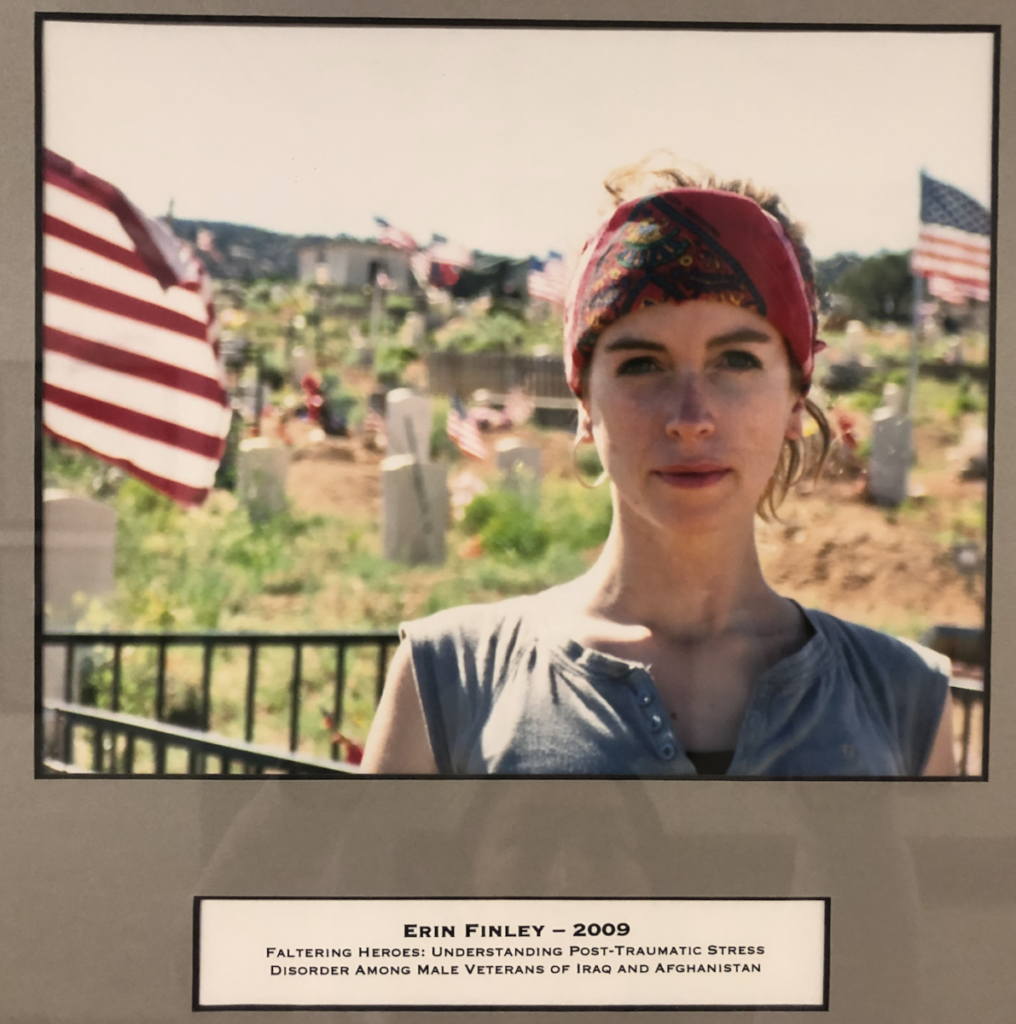ERIN FINLEY (2009)


POSITION:
Associate Professor at UT Health, 2008, San Antonio
Adjunct Assistant Professor at UT Health Science Center, 2012, Houston
Research Health Scientist at South Texas Veterans Health Care System
AWARDS:
2012 AAA Margaret Mead Book Award
EDUCATION:
BA in Anthropology, 1999, Emory University
MPH in Behavioral Science, 2006, Emory University
MA in Anthropology, 2007, Emory University
PhD in Medical Anthropology, 2009, Emory University
Postdoctoral Training in Health Services Research, 2010, South Texas Veterans Health Care System
PUBLICATIONS:
PhD Dissertation and Book
- (2009) Fields of Combat: Understanding Post-Traumatic Stress Disorder among Veterans of Iraq and Afghanistan. Emory Theses and Dissertations (ETD).
- (2011) Fields of Combat: Understanding PTSD among Veterans of Iraq and Afghanistan. Cornell University Press.
Articles
- (2022) Leykum, Luci K., Erin Finley, Lauren Susan Penney, Julie Parish Johnson, Jacqueline A. Pugh, Polly Hitchcock Noël. Engaging Veterans, caregivers, and system stakeholders to improve VA home and community‐based services. Health Services Research.
- (2020) Abraham, Traci Helen, Erin Finley, Karen L. Drummond, Elizabeth K. Haro, Alison B. Hamilton, James C. Townsend, Alyson J. Littman, Teresa Hudson. A Method for Developing Trustworthiness and Preserving Richness of Qualitative Data During Team-Based Analysis of Large Data Sets. American Journal of Evaluation.
- (2020) Finley, Erin, Suyen Schneegans, Megan E. Curtis, Vikhyat S. Bebarta, Joseph K. Maddry, Lauren Susan Penney, Don McGeary, Jennifer Sharpe Potter. Confronting challenges to opioid risk mitigation in the U.S. Health system: Recommendations from a panel of national experts. PLoS ONE.
BIOGRAPHY:
Dr. Erin Finley received her graduate degree in medical anthropology after completing her thesis with guidance from Dr. Peter Brown. She is invested in understanding sociocultural implications surrounding the health-seeking behavior and diagnosis of post-traumatic stress disorder (PTSD) among combat veterans. Her dissertation focuses primarily on male veterans living in San Antonio, Texas, as she uses methods of ethnography and interviews to understand their post-war experience. Finley’s continued research involves examining the “implementation of evidence-based practices” in healthcare as it pertains to veterans’ wellbeing. She describes herself today as a “medical anthropologist, implementation scientist, and health services researcher.”
Fields of Combat (2009) examines how differing sociocultural perceptions of PTSD influence the suffering and recovery of veterans living with combat trauma. Finley relies on methods of ethnography, interview, and participant observation with her training in cultural anthropology as she conducts 20 months of fieldwork in San Antonio, Texas. During this time she converses with soldiers, their loved ones, psychiatric practitioners, and members of the Veterans’ Affairs association in order to gain insight into the different ways that PTSD is defined among members of the community.
Finley begins her ethnography by exploring the reasons that motivate young men to enlist in military service. She explains that the decision to join is usually not made so much out of voluntary choice, but because of the lack of alternative choices available for young men coming from relatively low socioeconomic backgrounds. Enlistment is therefore seen as the most promising option for achieving subsequent upwards mobility because of the financial and educational awards provided at the end of service. Moreover, the cultural and political climate, especially as it pertains to conceptions of masculinity, often work in conjunction to portray military service as the ideal occupation for securing an identity of “manhood.”This underlying background provides important context for understanding the path to recovery as veterans attempt to return to “normal life” after a period of deployment. According to one informant, returning back home was more daunting than leaving for war-torn Iraq because of a perceived inability to reestablish a sense of normalcy. Finley describes their emotions as being in a place of “dislocation,” where veterans find themselves seemingly lost in a society they no longer recognize. Those who develop PTSD may also experience anxiety, panic attacks, restlessness, and bouts of anger that further alienate them from families and society.
The complexity of PTSD and its associated stigma may also bring about a positive feedback loop of loneliness and mental illness. For instance, the stigma surrounding the illness, as well as a lack of financial resources, may hinder families from supporting veterans in seeking professional help. Those who do not recognize the validity of PTSD as a medical condition may instead view unexplained anger as toxic masculinity, even going to the extent where families simply describe young men as “assholes.” This waning social support then worsens outcomes for patients with PTSD and correlates with a higher likelihood of depression and suicidality.
Finley describes how differing perceptions of PTSD create challenges towards providing veterans with the support that they need. Her work echoes the importance and tradition practiced by medical anthropology to separate understandings of disease and illness as she stresses the need to explore varying community-based definitions of PTSD that extend beyond the biophysical classification of disease. The emphasis on cultural context also implicates notions of ideal masculinity that often play a significant role in hindering psychological treatment. Therefore, efforts taken to advance the wellbeing of veterans must take these myriad of factors and their complex interplay into consideration.